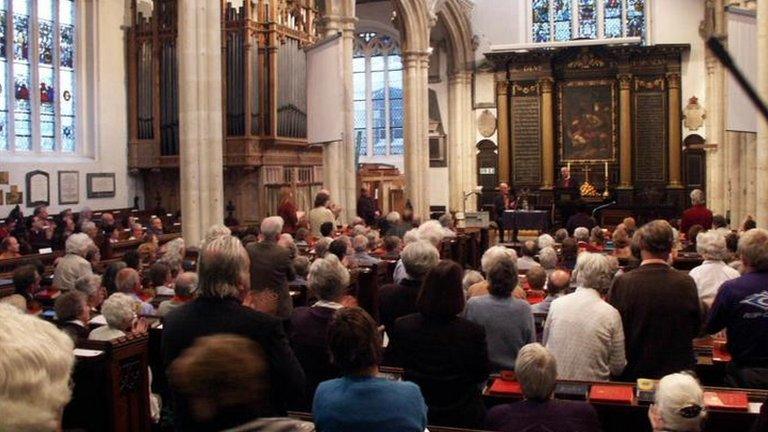Church of England urges 'fresh moral vision' from politicians
- Published
The Rt Rev Tim Stevens, Bishop of Leicester: "We want to encourage people... to engage more deeply with politics"
Politicians need to deliver a "fresh moral vision" ahead of the general election, the Church of England says.
In a letter urging congregations to vote, external on 7 May, the House of Bishops does not endorse a political party but encourages debate on issues such as nuclear defence and the economy.
It speaks of Britain's "almost moribund political culture".
Conservative MP Conor Burns said the letter was "naive", but David Cameron said he welcomed the move.
The 52-page letter - an unprecedented intervention by the House of Bishops - says "it is the duty of every Christian adult to vote, even though it may have to be a vote for something less than a vision that inspires us".
The Bishop of Norwich, the Right Reverend Graham James, said there was "disengagement with the contemporary political culture" and rejected the pleas of some, such as comedian and actor Russell Brand, for people not to vote.
'New approach'
He told reporters: "We as bishops are not as sexy as Russell Brand but we say 'do vote, do engage and do use the hard-won political freedoms that you possess'."
The letter says the country needs "a new approach to political life that will change the political weather as decisively as did the administrations of 1945 and 1979".
"The ideals that the Big Society stood for should not be consigned to the political dustbin," the letter adds.
The Big Society was among the Conservatives' flagship 2010 election policies and encouraged greater personal responsibility and community activism in shaping society and running public services.
But by January 2013 charities expressed "huge frustration" at a lack of progress with the idea, which they said appeared to be "going nowhere".
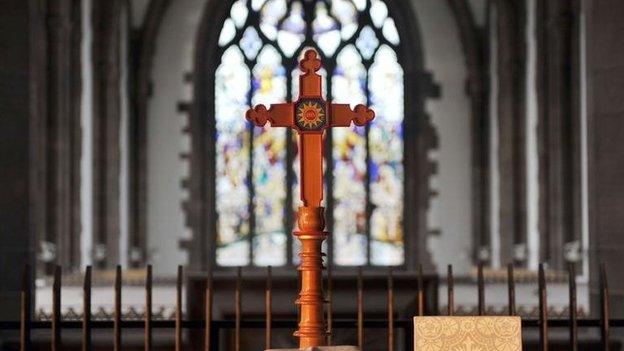
The document covers various issues including:
The economy: It credits politicians for helping Britain avoid the financial instability of other European countries, but criticises them for turning the banking crisis into a "political football"
Europe: It says there is an "enduring argument for continuing to build structures of trust and co-operation between the nations of Europe"
Defence: "Shifts in global strategic realities mean that the traditional arguments for nuclear deterrence need re-examining".
The state: "We need a richer justification for the state, a better account of the purposes of government, and a more serious way of talking about taxation"
Globalisation: "The problem is that no-one in politics today has a convincing story about a healthy balance between national government and global economic power"

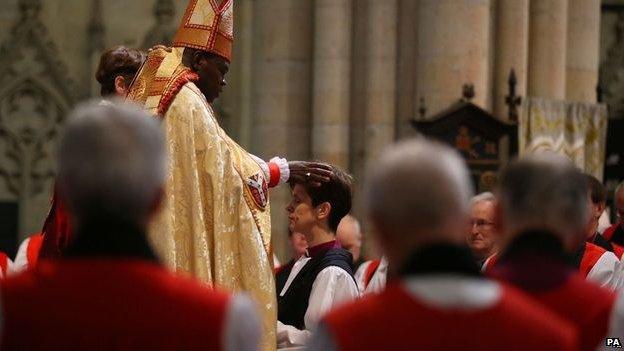
The Church of England consecrated its first female bishop in January
Analysis
By Caroline Wyatt, religious affairs correspondent
The bishops are well aware that their pre-election letter will be seen by some as a left-wing document - although they have been at pains to stress that their intention is not to back one party over another, nor to create a wish-list of policies - although they do ask voters to back the "living wage".
They say that the two UK administrations that offered genuinely new visions - Clement Attlee's Labour party in 1945 and Margaret Thatcher's Conservatives in 1979 - changed the way people in Britain looked at society, politics and the role of government and human relationships - but that today, neither vision addresses contemporary needs, at a time of increasing public alienation from mainstream politics.
In recent weeks, the Archbishops of York and Canterbury have asked questions about the increasing divides between North and South, or richest and poorest in the UK.
So this latest intervention, questioning what kind of society an increasingly diverse Britain wants to be, and what kind of power it wishes to wield on the world stage, is a sign of a Church more willing to use its position to speak truth unto power, even if it is not always welcomed.

'Left-wing leaning'
Conservative MP Nadine Dorries said she believed the letter had "glaring inaccuracies" regarding the economy and the Church should be more concerned with issues people wanted to hear its views on, such as abortion.
She said the bishops had a "very definite left-wing leaning to their message".
However, the prime minister said he was "keen for anyone to intervene in politics".
Mr Cameron said: "We want to have a political debate in this country.
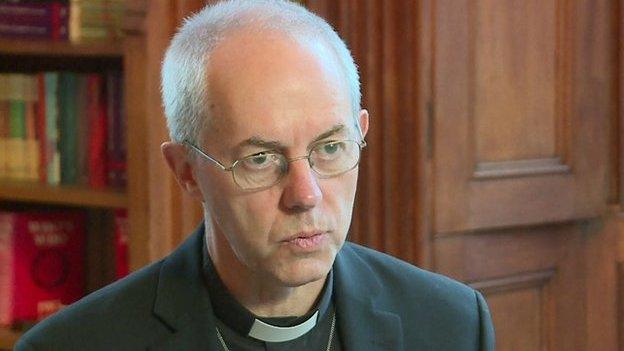
The Archbishop of Canterbury has recently intervened on political issues
"We've created an economy with genuine growth, real jobs and real security and I would say to the bishops, I would hope they would welcome that."
Labour leader Ed Miliband and Deputy Prime Minister Nick Clegg have not commented on the letter.
But Stephen Timms, Labour's shadow employment minister, tweeted, external that he welcomed the "thoughtful and authentically Christian reflection on the election debate".
'Bishops vindicated'
Conor Burns, MP for Bournemouth West, said the letter was "naive" in not taking into account the recession and the risk posed by countries like Iran.
Paul Whiteley, professor of government at the University of Essex, said the letter's policies were a combination of the Green Party, SNP and "perhaps a bit of Labour".
He said it had been a "long time since the Church of England aligned with the Conservative Party".
The director of public affairs for the Archbishops' Council, Malcolm Brown, rejected suggestions the letter was an attack on coalition policies and criticised responses, external to the document.
"The media response is to interpret it as an attack on the coalition," he said.
"David Cameron has reacted as if the letter was a rehash of earlier disputes about welfare reform.
"In short, the bishops have been thoroughly vindicated. If the responses of the media and the PM are typical of our political culture, it is unfit for purpose."
- Published15 January 2015
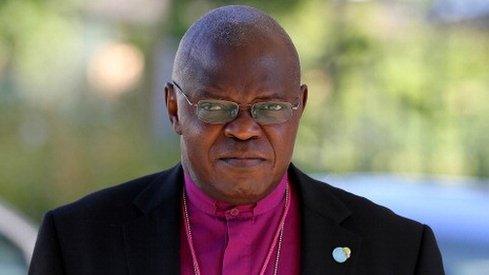
- Published20 February 2014
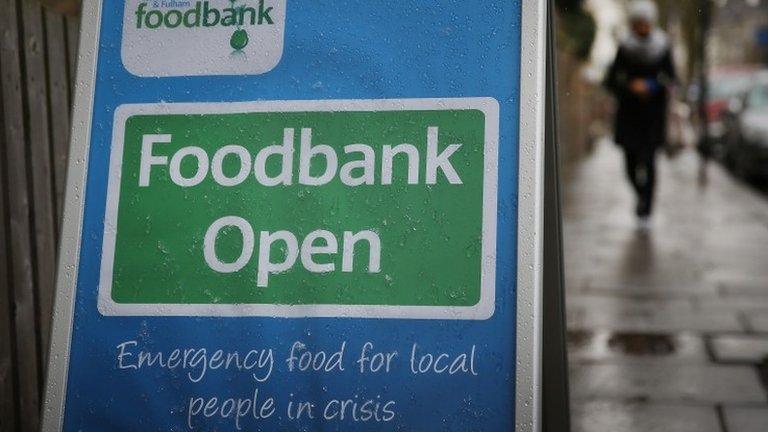
- Published20 February 2014
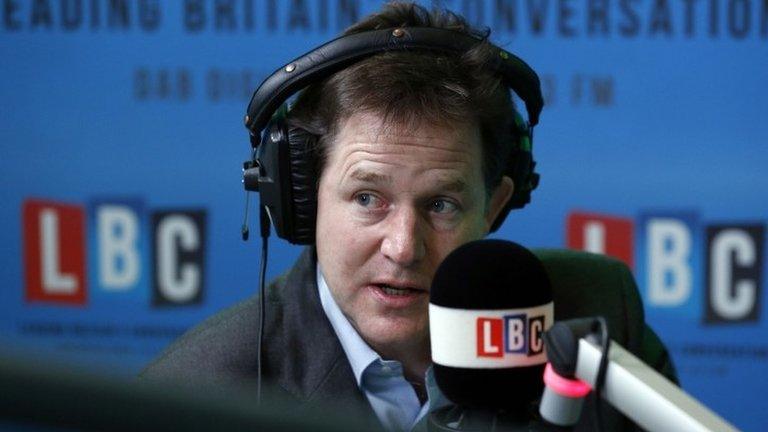
- Published26 January 2014
